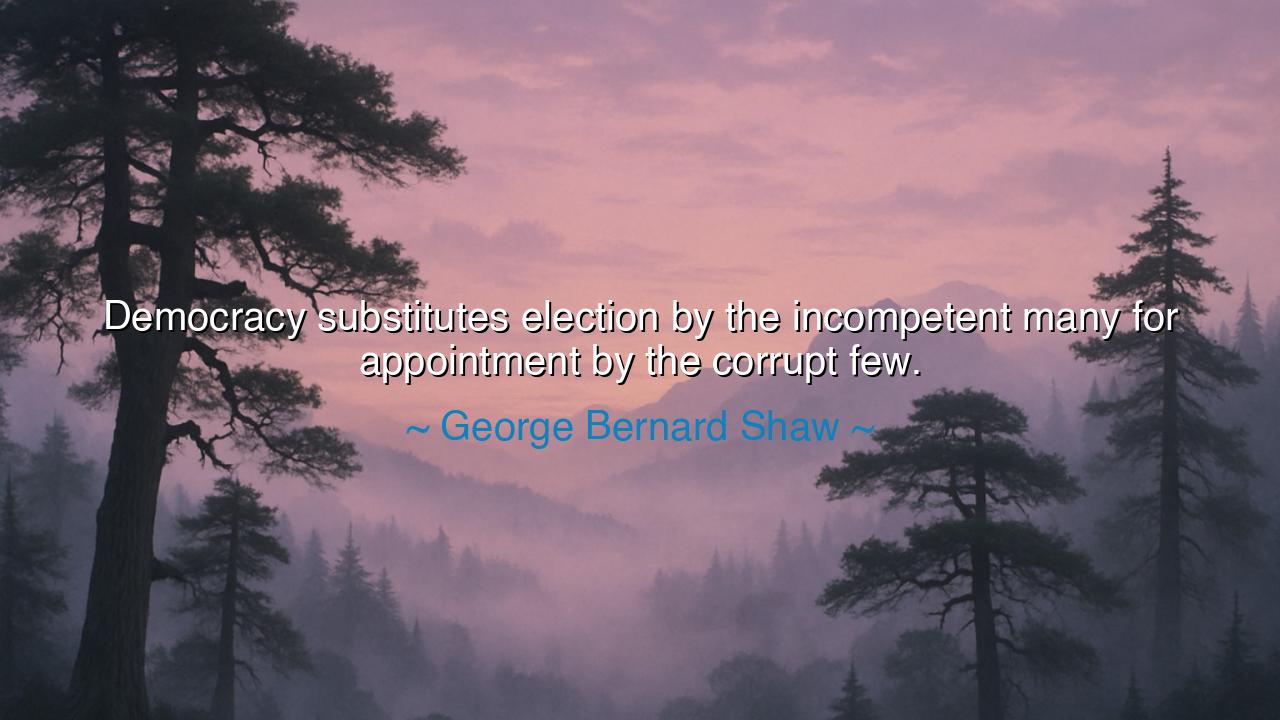
Democracy substitutes election by the incompetent many for
Democracy substitutes election by the incompetent many for appointment by the corrupt few.






When George Bernard Shaw declared, “Democracy substitutes election by the incompetent many for appointment by the corrupt few,” he was not merely mocking the political order of his time — he was wielding satire as a sword to expose a deeper truth about the imperfections of human governance. Shaw, ever the philosopher disguised as a playwright, understood that democracy, though noble in theory, was often flawed in practice. His words are neither a rejection of democracy nor an endorsement of tyranny, but a lamentation — that man, in all his striving for justice, cannot escape the frailties of his own nature. Whether power lies in the hands of the few or the many, the struggle between virtue and vice remains unchanged.
The origin of this quote can be traced to the late 19th and early 20th centuries, a time when Shaw lived amid the turbulence of industrialization, imperialism, and political upheaval. He had witnessed both the arrogance of the elite and the ignorance of the masses. As a member of the Fabian Society, he believed in gradual social reform and intellectual engagement, yet he never shied from exposing hypocrisy — whether it came from monarchs or mobs. In this quote, Shaw reflects on the paradox of democracy: that it was created to replace the corruption of hereditary rulers and aristocrats, yet often replaced one kind of corruption with another — the folly of the uninformed voter, easily swayed by emotion, rhetoric, or illusion. His words, though cynical in tone, are a challenge to all societies: that liberty without wisdom is no better than tyranny without shame.
Shaw’s insight is as timeless as it is uncomfortable. In a democracy, power belongs to the people — yet the people are human, prone to passion, fear, and persuasion. They can be deceived by false promises, blinded by prejudice, or lulled by comfort into apathy. In monarchies, corruption is confined to the few who rule; in democracies, it is diffused among millions who consent. Thus, Shaw’s irony cuts deep: the “incompetent many” are not wicked, but unprepared — they inherit the sacred duty of governance without always possessing the discernment to wield it. And when they fail, demagogues rise to exploit their weaknesses, becoming new tyrants born from the ashes of freedom.
History has offered countless examples of this paradox. Consider the fall of ancient Athens, the cradle of democracy itself. In its golden age, philosophers like Socrates and Pericles believed that reason and civic virtue could guide the people. But when fear and passion overtook wisdom, the same democratic assembly that once upheld liberty condemned Socrates to death for questioning their beliefs. The people, inflamed by demagogues, acted not as guardians of justice but as instruments of hysteria. Athens fell — not to the might of Sparta alone, but to the internal corruption of ignorance and pride. Shaw’s words echo this ancient tragedy: that the voice of the people, when untutored, can become the voice of folly.
Yet Shaw’s critique should not lead us to despair of democracy; rather, it should awaken us to its responsibility. He reminds us that democracy is not self-sustaining — it demands education, vigilance, and courage. The incompetence he speaks of is not inevitable, but curable. When citizens think deeply, learn broadly, and act with conscience, the “many” cease to be incompetent and become the rightful stewards of their own destiny. In this sense, Shaw’s warning is a call to enlightenment: that freedom must be earned through wisdom, and self-government must be grounded in self-discipline.
We see this transformation in the lives of reformers and revolutionaries who sought to elevate the mind of the people rather than exploit their ignorance. Frederick Douglass, the great abolitionist, once said, “Knowledge makes a man unfit to be a slave.” He understood, as Shaw did, that ignorance is the ally of oppression. When the oppressed gain wisdom, they gain power — and when the people are educated, democracy becomes more than a word; it becomes a covenant of reason and justice. In every era, the health of a nation has depended on whether its citizens choose to think or to follow blindly.
The lesson of Shaw’s words, then, is both sobering and hopeful: democracy is only as wise as its people. It is not a guarantee of virtue, but an opportunity for it. We must resist both the arrogance of the few who would dominate and the apathy of the many who would drift. To honor democracy is not to worship it blindly, but to refine it continually — through thought, courage, and integrity. Shaw’s wit pierces through the illusion that any system can save us from ourselves; he reminds us that the true battle for good government is fought not in parliaments, but in the hearts and minds of the governed.
So let us remember his words not as mockery, but as a mirror. The cure for incompetence is education; the cure for corruption is conscience. A people that learns, questions, and holds power accountable will rise above both the folly of the crowd and the greed of the few. In this, Shaw’s paradox finds its redemption — for when the many become wise, and the few become just, democracy fulfills its promise: not the rule of ignorance or privilege, but the triumph of humanity guided by truth.






AAdministratorAdministrator
Welcome, honored guests. Please leave a comment, we will respond soon